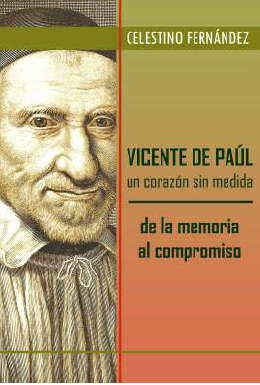 A new Spanish-language book “Vincent de Paul, a Heart to Excess. From Memory to Commitment” seeks to bring Vincent from the 17th to the 21st century.
A new Spanish-language book “Vincent de Paul, a Heart to Excess. From Memory to Commitment” seeks to bring Vincent from the 17th to the 21st century.
The author affirms
What interests me is to highlight that Vincent de Paul is today more current and is more alive than ever… In short, I intend to remember who he was, what he did, why he did it, from where he did it, how he did it, with what consequences he did it… this Gascon peasant and good Samaritan who answers to the name of Vincent de Paul…
Second –and according to the subtitle- I wish that the “memory” of Vincent de Paul becomes a commitment, above all and especially for his followers, Vincentian men and women. If someone’s memory remains only in admiration and it does not go on to imitation and commitment, then it is not a genuine memory, it remains simply as a fleeting emotion or in the scenery of good will”.
For several years, we have been seeing a dramatic growth of the Vincentian literature. The figure of Saint Vincent de Paul has been studied, commented on and presented from the most diverse perspectives. We could say that there is no aspect left out about the “great saint of the great century”. We could even affirm that there is no reason for another book speaking about St. Vincent de Paul, of his thought, of his spirituality or of his evangelizing projects.
However, there is always place for a new and original book. This is the case of the book we are presenting: Vincent de Paul, a Heart to Excess. From Memory to Commitment. The book was written by Fr. Celestino Fernández, C. M., of the Province of Madrid, and published by La Milagrosa of the Province of Madrid. This book is relatively new: it was published last autumn, and it is, in such a short time, already in its third edition.
We are, therefore, before a “different” book, mainly for its three aspects: for the approach it presents of Vincent de Paul’s figure, for the consequences and demands that it brings for the Vincentian Family, and for every Christian who wants to be committed to the building of the Kingdom of God for the poor, and for the language it uses.
Certainly, this book is not a biography of the founder of the Congregation of the Mission and the Daughters of Charity. It is neither a systematic essay about the personality of the saint of charity. It is a passionate approach to the radical option of a “God seeker”, to the historical footprints of a “walker to the wind of the Spirit”, to the experience of an “open eyed” believer, and to the tenacity of an incorruptible fighter for the cause of the poor and the excluded. The first part of the book, entitled memory, perfectly reflects this intense and surprising path of Vincent de Paul, and how very present it is in the “poor and for the poor” Church that Pope Francis wants.
This book serves as sort of stimulus so that the Vincentian Family does not fall asleep on its past glories and revitalizes its being and mission. That is why, the second part is entitled commitment. That is to say, the book strongly underlines that if Vincent de Paul’s figure, spirituality, thinking, struggle and effort are completely modern; his followers have to make effective that modernity, have to go from the affectionate memory to the effective and real commitment.
To this effect, the author of the book indicates four unavoidable and basic commitments: the pastoral criteria and needs to carry out today and here charity and mission; the visibility and the need of the lay people being accurate to the letter and spirit of the II Vatican Council; the attention to a court which is characteristic of this 21st century: the social media, above all the cybernetic space of the Internet, a court which frightens us, but which has to be evangelized and from which we have to evangelize; the place where we have to put ourselves, the Vincentians, to be faithful to the legacy of the founder, a place which is in the peripheries and in the margins of society.
We must especially draw attention to the language this book has and which the author uses. The author honors his two vocations: the Vincentian one and the journalistic one. Two complementary vocations which are evident in the present book. Because, he has known how to speak about St Vincent with an agile, simple, direct language, to the point, without superfluous adornment, with the language spoken in the streets and in this time. In summary, he has known how to make St Vincent’s person and spirit available to daily life people. All this without losing the theological depth and the intellectual seriousness.
It is worthwhile to approach this book, and it is worthwhile to read it carefully, savouring each page. It is not a book only written for the members of the Vincentian Family, but for those who want to fight for a Church more incarnated in the poor and more servant of the poor, and who struggle in many ways for a more fraternal, fair and solidary world.
Adapted from NUNTIA of the Congregation of the Mission. Hopefully, it will be quickly translated into English.
See the full catalog of books (Catálogo Libros) published by La Milagrosa.





0 Comments